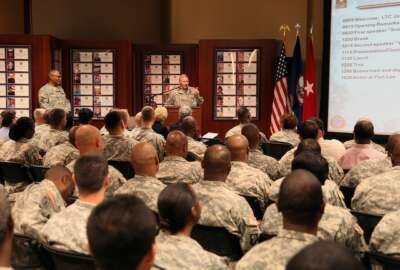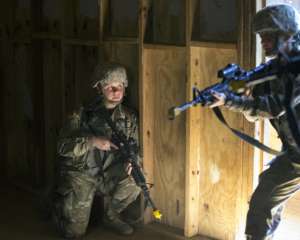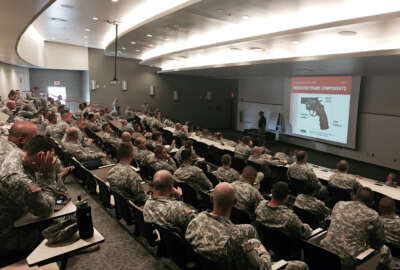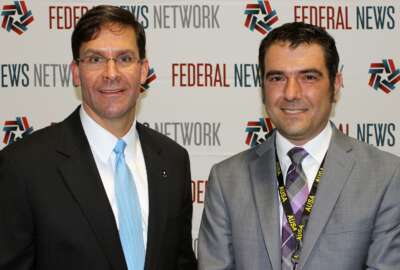
To free up money and time, Army steadily cutting mandatory training
Since April, the Army has cut more than 60 training and administrative requirements. Top official say the goal is to redirect time and resources into readiness and...
Best listening experience is on Chrome, Firefox or Safari. Subscribe to Federal Drive’s daily audio interviews on Apple Podcasts or PodcastOne.
As part of a push to restore readiness, the Army has been steadily getting rid of what it views as unnecessary administrative burdens on the force over the past seven months.
Since April, the service’s top official has issued more than a dozen memos cutting administrative demands, and says there’s more to come. In some cases, the Army has removed training or paperwork requirements entirely. Though as a general matter, it’s leaving decisions about whether formerly-mandated items still make sense to lower levels of the service’s chain of command.

This week, for instance, the Army did away with the requirement for all personnel to undergo annual corrosion prevention training. Two weeks earlier, it told aviation commanders they could convene safety meetings however often they deemed prudent, removing a mandate that they be held once a month.
“The message across the board has been to empower commanders to make decisions that are best for their units,” Army Secretary Mark Esper said Thursday at the American Enterprise Institute. “And the whole purpose is to give the commanders the freedom to do it the way they do, and not mandate that every Friday afternoon at 4:30 you have to do an hour-long safety briefing. I think commanders generally understand that they will do safety briefings, it may just be done at the squad level or it may be done at the soldier on soldier level. But we’re not going to mandate from Mt. Olympus how to do them and when to do them.”
From 5 to 42 days of training
Over the past year, the Army has combed through roughly 100 of its regulations in an effort to determine which ones include training or other administrative burdens that are no longer relevant or are overly-prescriptive.
Since April, that project has resulted in 16 separate directives eliminating previous headquarters-directed requirements. Each contains between four and seven specific actions that either do away with service-wide dictates entirely, or move authority for whether and how to conduct them to lower levels.
The changes run the gamut, from getting rid of the requirement for units to report progress on transgender training — the Army says that training is now complete — to cutting the frequency of command climate surveys and media awareness training. Another change is eliminating the need for commanders to conduct regular headcounts in their dining facilities.
In an October interview with Federal News Network, Esper said the culling of training requirements was sparked by the realization that the Army’s headquarters edicts were consuming entirely too much of soldiers’ time.
When he served in uniform in the 1980s, the entire canon of Army-directed training consumed about five days of an average soldier’s time per year, he said. Since then, the burden has grown to 42 days.
Related Stories
The secretary framed the reduction in mandated training as part of a broader push to free up time and money in the Army’s budget It’s an effort he hopes will let it redirect manpower and funding toward rebuilding readiness and modernizing the service’s weapons systems.
“What I’m asking of everybody is to put real meaning behind reform,” he told troops at Joint Base Lewis-McChord near Tacoma, Washington, this week. “Look at everything you do and ask yourself, ‘Does this make sense? Does it enable readiness? Can I do things better, cheaper, faster?’”
He also argued that the cutbacks in mandatory training were key to building leadership qualities within the force, particularly in the case of younger officers and NCOs.
“We spend a great amount of time recruiting, training and educating leaders. If we then bring them into a unit and say, ‘You must do this this way at this time with these training devices,’ we take all the innovation, all the responsibility, all the authority away from them at a time in their career where you want to build trust and confidence,” he said. “And the best time to build trust and confidence is in training, in peacetime. When the balloon goes up and you deploy those young squad leaders, platoon sergeants, company commanders at a forward operating base in eastern Afghanistan, you’ve got to trust that you trained them well, and they had to have the confidence and trust in you too. I think the more we can give people room to make mistakes, to learn from others and not dictate from on high, I think you get a better force that will endure in any type of situations we may face in the future.”
Copyright © 2025 Federal News Network. All rights reserved. This website is not intended for users located within the European Economic Area.
Jared Serbu is deputy editor of Federal News Network and reports on the Defense Department’s contracting, legislative, workforce and IT issues.
Follow @jserbuWFED





